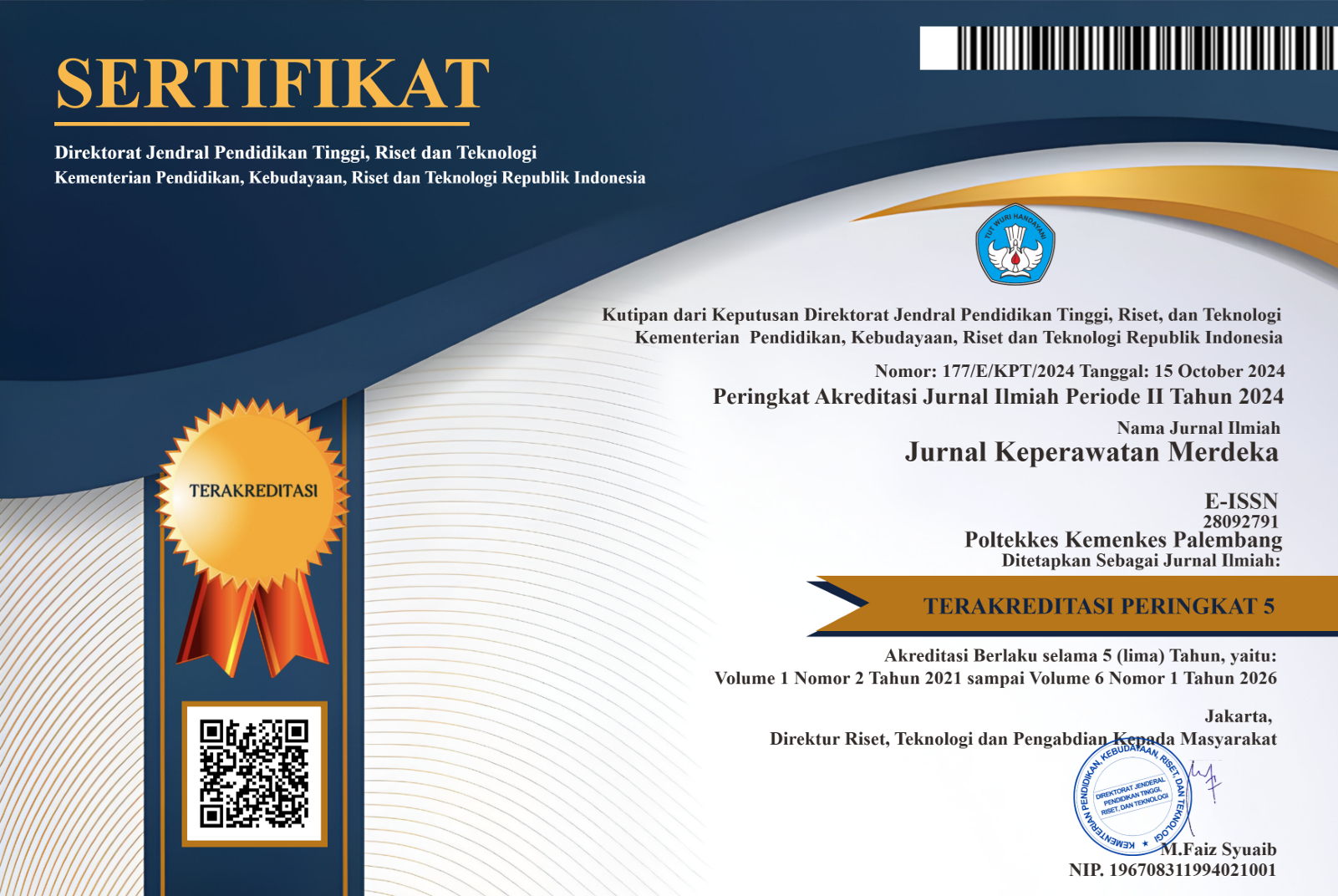Pengetahuan Mahasiswa Pria Non Medis Tentang Risiko Infertilitas Pria
Abstract
Latar Belakang : Kesehatan reproduksi pria jarang menjadi perhatian dibandingkan dengan kesehatan reproduksi wanita. Prevalensi infertilitas yang dilaporkan di Indonesia adalah 21,3% dan 40% faktor prevalensi ini berasal dari pria. Penelitian ini bertujuan untuk mengetahui pengetahuan mahasiswa pria nonmedis tentang risiko infertilitas. Metode : Metode penelitian yang digunakan adalah deskriptif kuantitatif. Penelitian dilakukan di Universitas Swasta di Indonesia Barat pada bulan Mei-Juni 2020. Sampel penelitian ini adalah 63 orang mahasiswa pria nonmedis yang dipilih dengan teknik convenience sampling. Instrumen dalam penelitian ini berupa kuesioner yang dibuat berdasarkan literatur dan telah diuji validitas dan reliabilitasnya. Hasil : Penelitian menunjukkan bahwa 54% mahasiswa nonmedis memiliki pengetahuan baik, 36,5% memiliki pengetahuan cukup dan 9,5% memiliki pengetahuan kurang. Persentase tertinggi adalah responden pada usia 19 tahun dan sebesar 78% responden memperoleh sumber informasi infertilitas dari internet. Kesimpulan : Berdasarkan pengetahuan seluruh mahasiswa pria nonmedis, mahasiswa mungkin membutuhkan informasi kesehatan dari pakar. Perlu dilakukan penelitian lebih lanjut untuk mengidentifikasi pengaruh pemberian informasi kesehatan reproduksi oleh para ahli terhadap tingkat pengetahuan mahasiswa pria nonmedis.
References
WHO (2012). Sexual and reproductive health [Internet]. Available from: https://www.who.int/reproductivehealth/topics/infertility/burden/en/
Almeling R. GUYnecology (2020) : The Missing Science of Men’s Reproductive Health [Internet]. Univ of California Press; Available from: https://books.google.co.id/books?id= snfnDwAAQBAJ&lpg=PR9&ots=ydcKyqUDJW&dq=infertility male%3B knowledge%3B non medical male student%3B exposure hot from stove%3B pdf&lr&hl=id&pg=PA3#v=onepage&q&f=true
Budiman B. (2018) Akses Dan Penggunaan Teknologi Informasi Dan Komunikasi Pada Rumah Tangga Dan Individu. J Penelit Komun dan Pembang ;15(1):1.
Bunting L, Boivin J (2008) Knowledge about infertility risk factors, fertility myths and illusory benefits of healthy habits in young people. Hum Reprod 2008;23(8):1858–64
Daumler D, Chan P, Lo KC, Takefman J, Zelkowitz P (2016) . Men’s knowledge of their own fertility: A population-based survey examining the awareness of factors that are associated with male infertility. Hum Reprod 31(12):2781–90.
Hariri A, Abbarh S, Ameen A, Sabra A, Salman A, Alhulaimi Y, et al.(2019) Prevalence and awareness of varicocele among athletes in Riyadh, Saudi Arabia. Res Reports Urol 11:21–7Harnani Y, Marlina H, Kursani E. (2019) Teori Kesehatan Reproduksi.
HIFERI; PERFITRI.(2013) Buku Konsensus Penanganan Infertilitas. Konsensus Penanganan Infertil 2013;(1):1–73.
Kaszkan Workppa (2013) qualitative study of Ottawa university students’ awareness, knowledge and perceptions of infertility, infertility risk factors and assisted reproductive technologies (ART). Reprod Health [Internet];10(1):1–10. Available from: http://ovidsp.ovid.com/ovidweb.cgi?T=JS&PAGE=reference&D=emed11&NEWS=N&AN=2013540680
Makenzius M, Gådin KG, Tydén T, Romild U, Larsson M. (2009) Male students’ behaviour, knowledge, attitudes, and needs in sexual and reproductive health matters. Eur J Contracept Reprod Heal Care ;14(4):268–76.
Meissner C, Schippert C, von Versen-Höynck F. (2016) Awareness, knowledge, and perceptions of infertility, fertility assessment, and assisted reproductive technologies in the era of oocyte freezing among female and male university students. J Assist Reprod Genet 2016;33(6):719–29.
Niederberger C. Re (2019): Tobacco Smoking and Semen Quality in Infertile Males: A Systematic Review and Meta-Analysis. J Urol 202(3):446.
Notoatmodjo S (2014). Ilmu Perilaku Kesehatan. Jakarta: Rineka Cipta.
Rusanti MA, Negara IMO, Kurniawan Y.(2019) Tingkat Pengetahuan Mahasiswa Nonmedis Laki-laki tentang Fertilisasi Laki-laki dan Kualitas Sperma di Denpasar.8(10):8–12.
Rouchou B (2015). Infertility Knowledge, Attitudes, and Beliefs of College Students in Grenada. Sci J Public Heal 3(3):353.
Salim S, Naser A, Alhabbash MI (2016). Male Infertility Expert System Diagnoses and Treatment.181–92.
Zarak MS (2018). Assesment of knowledge and awareness about male infertility among the students of university of balochistan , Quetta , Pakistan Orignal Research Orignal university of Balochistan, Quetta, Pakistan. Assessment of knowledge and awareness about male infertility among the students of. (November 2017):10–3.
Copyright (c) 2022 JKM : Jurnal Keperawatan Merdeka

This work is licensed under a Creative Commons Attribution-ShareAlike 4.0 International License.
Authors who publish with this journal agree to the following terms:
- Authors retain copyright and grant the journal right of first publication with the work simultaneously licensed under a Creative Commons Attribution License that allows others to share the work with an acknowledgement of the work's authorship and initial publication in this journal.
- Authors are able to enter into separate, additional contractual arrangements for the non-exclusive distribution of the journal's published version of the work (e.g., post it to an institutional repository or publish it in a book), with an acknowledgement of its initial publication in this journal.
- Authors are permitted and encouraged to post their work online (e.g., in institutional repositories or on their website) prior to and during the submission process, as it can lead to productive exchanges, as well as earlier and greater citation of published work













